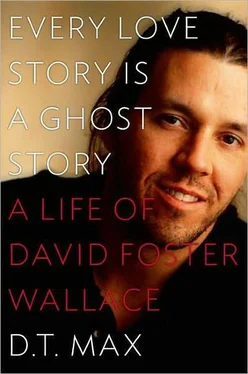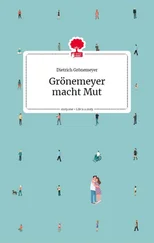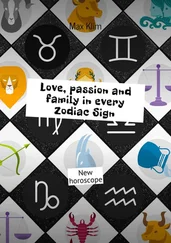Wallace did have one literary project in which he was putting his energy. Harper’s had asked him to write a 1000 word piece on television for a forum. It had of course sprung to larger-than-life dimensions, consuming his untapped energy. TV remained a subject of paramount interest to him. When he had accepted the assignment, he had joked to Markson, who had been a friend of Malcolm Lowry, that having him write about television was “rather like asking the Consul in his late stages to write a haiku on the history of distillation.” He found interesting tidbits in Widener Library at Harvard to suggest he might be an outlier but he wasn’t a singleton. In recent years, he learned, for instance, educated viewers had come to watch as much TV as uneducated ones; six hours a day was now the national average. He wrote page after page as he tried to wrestle the filthy machine to the mat. He had little hopes of the work being published, so what he was doing was memorandizing himself, though, as he told Markson, even the kill fee — around $1,000—would be “sumptuous.”
The assertion that television promoted passivity was not new — it was standard in the works of cultural critics like Todd Gitlin and Mark Crispin Miller — but for Wallace the charge wasn’t theoretical; it was personal, crucial. TV’s treacly predictability held him in strange thrall, and during periods of collapse he seemed almost literally attached to it. The students he was teaching made him feel the problem was worse than he had known. They were the Letterman generation he had imagined in “My Appearance,” proud of their knowingness. “They’re all ‘television’ majors, whatever that means,” he complained to Markson, adding that he’d had his wrist slapped by his department for “‘frustrating’ the students” with a DeLillo novel (he does not say which) by which he meant to wake them up: “Most…desire to read nothing harder than news headlines off TV cue cards.”
Wallace knew he did not want to stay at Emerson long. He thought about applying for a fellowship but realized he had nothing to propose to fund. “I want to start trying some creative writing again,” he wrote Moore in November 1990, “but I find now that I am terrified to start, have forgotten most of what I (thought I had) learned, and feel like the little reptile section of my brain that used to be in charge of really good writing is now either dead or playing possum in protest.” But whereas a few years before his frustrations would have sent him on a pot binge, his daily recovery sessions taught him how to wait it out. He had just finished his first year of sobriety, a significant event for him. There were still meetings, time with his sponsor, and he also eventually saw a private therapist at Karr’s urging. Predictably, he found therapy both appealingly and apprehensively absorbing. But it gave him another tool to deal with moments of frustration such as this one. “There is absolutely nothing I can do except accept the situation as it is and wait patiently for some fullness-of-time-type change,” he wrote Moore. “The alternative to patience is going back to the way I used to live, which Drs. and non-hysterics at the rehab told me would have killed me, and in a most gnarly and inglorious way, before I was 30.”
Still, acceptance wasn’t a lesson that he took in evenly in all aspects of his life. Where the alcohol and pot had held sway there was now an enormous amount of anger that was not easily acknowledged. Big Craig happened to watch a car cut off Wallace one day when the latter was driving near Foster Street. In fury Wallace rammed his car into the other person’s. “He got out of the car, scratching his head,” Big Craig remembers. “‘Oh Gee, what happened?’”
Signifying Rappers: Rap and Race in the Urban Present , Wallace’s collaboration with Mark Costello, who was now an assistant district attorney in Manhattan, came out in November 1990, a volley from the past. “ Signifying Rappers is the first serious consideration of rap and its position as a vital force in American cultural consciousness,” an ad for the book in the Voice Literary Supplement declared. But Wallace cautioned in the book’s pages, “If you’re reading this in print it’s already dated.” And he was right. By the time the book was published, rap had ceased to be a revelation, though it was still in the news. Its threat to be, as Wallace put it in the book, the “prolegomena to any future uprising,” had been contained. Tipper Gore and George Will had denounced it, the noted professor Henry Louis Gates supported it, and a Florida prosecutor was bringing charges against 2 Live Crew for obscenity. The publisher’s press release offered, “The Authors — white, educated, middle class — occupy a peculiar position, at once marginal and crucial to rap’s us and them equations.” Few reviewers or readers seemed to know what to make of the joint effort. The authors’ stance that rap was “quite possibly the most important stuff happening in American poetry today” felt at once too clever and obvious. The way their alternating short takes on rap resembled rap’s own samplings went unappreciated. At the least, Wallace got to set out his new awareness of the power of addiction. He might have been looking around the Granada House common area when he wrote of a
centerless pop-culture country full of marginalized subnations that are themselves postmodern, looped, self-referential, self-obsessed, voyeuristic, passive, slack-jawed, debased. 12
Or it may have been his idea of the student body at Emerson.
Though the book attracted little notice, Wallace welcomed its appearance. He was happy to have it in his hands at a moment when he had so little else to show for his work. “I’ve gone from thinking it slight and silly to something I want to send to friends,” he wrote Moore, who arranged a review of the book in the Review of Contemporary Fiction . Wallace was so poor that Moore gave him a free subscription so he could read the piece. Wallace asked him whether he might help him find a way out of teaching. “I am the best copyeditor I’ve ever seen,” he bragged, wondering if he could make enough at the trade to “move to the midwest and live in a hovel.” Moore responded that the Dalkey Archive at Illinois State University was looking for a publicity director. Wallace begged off, saying he “couldn’t even take prom-rejection in high school.”
The relationship with Karr was not moving forward, becoming another source of anger. Karr and her husband were still living together. She says she had cut off all contact. Still, Wallace thought if he could have Karr, his life would come together. His time in the house of the dead would be over. She worried about his tendency to what he called “black-eyed red-outs.” She took a fellowship at Radcliffe. He went to the Harvard Law Library and wrote her a note explaining how she could divorce her husband and still keep custody of their son and a share of their assets. She showed it to her spouse. One day she looked out her office window to find Wallace cursing her and demanding the return of a Walkman he’d lent her. When she threw it down to him, he took it, stomped off, and put his fist through a car window.
Several months later, in April 1991, he wrote to Markson that he had torn the ligaments in his ankle playing softball and refused the painkillers the doctors offered him, a decision that took “every shred of will I’ve got.” “What’s unendurable is what his own head could make of it all,” Don Gately thinks in an important scene in Infinite Jest , as he lies in the hospital with a gunshot wound, refusing any drugs. “But he could choose not to listen.” Real life was not so heroic: “I am not taking it well,” Wallace remarked to Markson. “I have substituted chronic complaining for analgesic, and so far it’s worked OK.” 13He walked with crutches but could not sit up, which meant he could not type, which in turn excused him from book reviewing, a relief. He read for pleasure instead, enjoying James Baldwin a lot and Thomas McGuane much less. Walker Percy gave him “the creeps.” He started The Armies of the Night by Norman Mailer and hated it, admitting in a letter to Markson that he found the writer “unutterably repulsive. I guess part of his whole charm is his knack for arousing strong reactions. Hitler had the same gift.” He read Vineland and discovered his love for Thomas Pynchon was gone, whether because he had changed or his hero had. He wrote Franzen that he found Pynchon’s first novel in nearly two decades “flat and strained and heartbreakingly inferior to his other 3 novels. I get the strong sense he’s spent 20 years smoking pot and watching TV — though I tend to get paranoid about this point, for obvious reasons.” Franzen and he were continuing their bumpy version of bonding. He scolded Franzen for moving back to New York City. “The people I’ve known there who’ve led real lives there never seem quite to escape,” he wrote. In response Franzen sought to cheer his friend with a gentle cuff: “I think that eventually you’re going to start doing fiction again and that it will be even better than what you’ve done so far — as funny, as smart, but with some clearer connection to the soul.” He quoted Wallace a poem by Emily Dickinson to underscore his point:
Читать дальше












